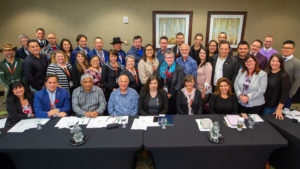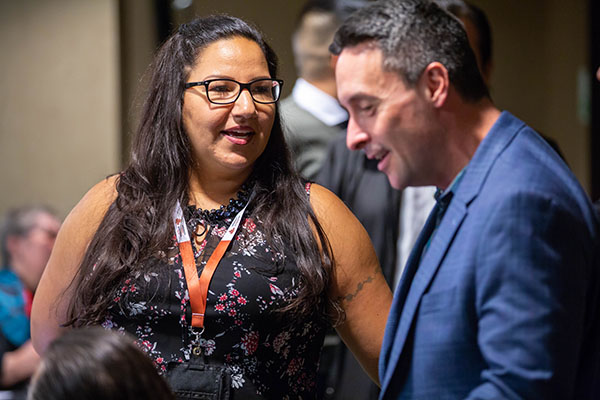 Indigenous tourism is a job creator and nation builder. It has distinct characteristics, with an emphasis on heritage and culture, and aims to improve social and economic circumstances. Market- and export-ready Indigenous tourism experiences are authentic; they aim to preserve and strengthen traditions, customs, and culture and to improve people’s understanding of Indigenous history.
Indigenous tourism is a job creator and nation builder. It has distinct characteristics, with an emphasis on heritage and culture, and aims to improve social and economic circumstances. Market- and export-ready Indigenous tourism experiences are authentic; they aim to preserve and strengthen traditions, customs, and culture and to improve people’s understanding of Indigenous history.
Tourism HR Canada, in partnership with the Indigenous Tourism Association of Canada, held an inaugural consultation session with Indigenous leaders and other key stakeholders on October 28 in Saskatoon, on Treaty 6 Territory and the homeland of the Métis. Co-facilitated by Trina Mathers-Simard, Executive Director, Aboriginal Experiences, and Philip Mondor, President and CEO, Tourism HR Canada, the event featured three accomplished Indigenous entrepreneurs who shared their stories. The speakers demonstrated the unique and diverse types of Indigenous tourism offerings.
The event is one of 30 sessions to be held over the next two to three years that will define the current landscape of labour needs while identifying future knowledge and skills required of tourism workers. This is the first comprehensive study of this type for the tourism sector in Canada; it will better position the sector to be globally competitive and responsive to growing markets. The project includes dedicated funding to define the unique skills and knowledge specific to Indigenous tourism, which will help ITAC, tourism businesses, and others demonstrate where training dollars must go; it will inform policies and programs and demonstrate the acute need and priority to fund an Indigenous Tourism Labour Market Strategy.
The first speaker was Kevin Eshkawkogan, CEO of the Indigenous Tourism Association of Ontario and past CEO of Great Spirit Trail, a tourism company comprising a hotel and conference centre on Manitoulin Island and the Sagamok region in Northeastern Ontario. The Great Spirit Trail offers nature-based and cultural tourism from an Aboriginal perspective, including adventures ranging from relaxing day trips and educational cultural workshops to wilderness eco-adventures via canoe and horseback.
Amongst many of the insights Kevin shared, he emphasized the foundational skills and knowledge required of a successful Indigenous tourism entrepreneur, including:
- Good knowledge of money management and the essentials of accounting and finance
- Developing and delivering products and services that uphold cultural integrity (and refer to guidelines set by the community that continue to be instrumental in informing good practice)
- Product development, with extensive knowledge of developing products aligned with the market and that are scalable and sustainable
- Ability to establish partnerships, engage the community, collaborate with other businesses and groups
- Effective communications skills
- Marketing knowledge
- Knowledge of funders (i.e., where to get money) and regional support
And, Kevin underscored the need to invest in ongoing professional development and the continued pursuit of Indigenous knowledge.
The second speaker was Kylik Kisoun Taylor, owner and operator of Tundra North Tours, located in Inuvik, Northwest Territories. Tundra North Tours provides authentic Arctic experiences, connecting visitors with the land, cultures, and people of the north. Kylik believes that sharing his way of life and showcasing his culture is a way of preserving it, and that tourism creates jobs and a sustainable economy for Indigenous people throughout Canada, strengthening cultural bonds and an understanding of what it means to be Indigenous.
Kylik was passionate about his interest in fostering the development of more Indigenous tourism experiences. Core to his values and lifestyle, he spoke about the practical skills and knowledge that helped ensure success:
- Development of a comprehensive business model and plan; one that demonstrated financial viability, but was founded on the preservation of cultural integrity
- Social, cultural, and environmental skills combined with basic business skills
- Ability to establish ‘buy-in’, i.e., engaging the community, partners, and other groups
- Ability to educate customers—to transfer knowledge of customs, traditions, history
Kylik spoke in-depth on skills and knowledge for Indigenous businesses seeking to attract international markets, and the need for continued professional development and information seeking. The theme of mentoring came up frequently, as did meeting customer expectations. Known for his insightful one-liners, Kylik summed up his views by saying, “It’s all about aligning dreams”, which encapsulated the types of skills and knowledge required of an Indigenous entrepreneur, and the match to meeting visitor expectations.
The third speaker was Patricia Dunnett, General Manager, Metepenagiag Heritage Park (MHP), Metepenagiag Mi’kmaq Nation (Red Bank), New Brunswick. MHP is a state-of-the-art facility that celebrates Mi’kmaq culture through music, oral history, exhibits, trail tours of the traditional Mi’kmaq lands, and hands-on cultural activities. The park’s mandate is to preserve, protect, and promote two significant National Historic Sites, the Augustine Mound and the Oxbow, both ancient and historic sites of the Mi’kmaq, dating back more than 3,000 years.
In Patricia’s story, community and partnerships factored large. Patricia emphasized skills and knowledge that involved extensive community links, such as the ability to seek and develop meaningful partnerships, and to gain community support and engagement in product development. Like the previous two speakers, Patricia also noted the need for skills on communicating and educating visitors about culture, and skills on product development. Patricia emphasized the way this was achieved: establishing mentorships and additional learning opportunities, building trust, and being resilient and persistent—traits that reinforced the very values embodied by the Indigenous experience.
Although this article only hints at a sample of the knowledge and skills discussed, it illustrates the power of storytelling and the richness of experience. The stories also remind us of the vast potential and demand to grow the market—something that can only be achieved with an investment in education and training. A key outcome of the discussions was the agreement that a pan-Canadian Indigenous Tourism Labour Market Strategy is needed.
This event was the beginning of the journey to document the experiences of successful Indigenous tourism entrepreneurs. It highlighted that Indigenous tourism is largely about social entrepreneurship and consists not only of economic prosperity, but also includes collective cultural and social identity and wellbeing. Defining the skills and knowledge required is a complex undertaking, and there are unique lessons to learn from those who have created the path, and from elders and other stakeholders.
Connor Tenasco, an Indigenous youth, was asked to comment on his reflections of the discussions. He said, “It’s all about the building of respect and helping to enlighten and educate others on the culture and heritage.” He expressed the immense potential and opportunity of Indigenous tourism, and, beyond economic benefits, how it leads to job creation and self-determination.
To learn more about this project and future consultation sessions, check out the Future Skills Framework.

